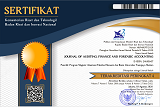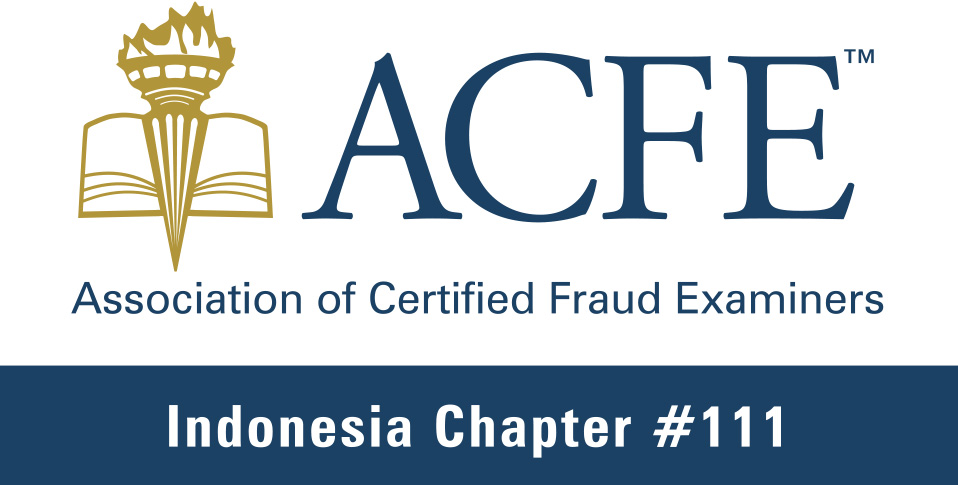Religion and Employees Fraud Prevention: With Moderation of Spirituality, Leadership and Oganizational Culture
Abstract
Keywords
Full Text:
PDFReferences
ACFE. 2018. Report to The Nations 2018 Global Study On Occupational Fraud and Abuse.
Afsari, S. F. (2016). Analisis Faktor-Faktor yang Mempengaruhi Kecenderungan Kecurangan
(Fraud) di Sektor Pemerintahan Berdasarkan Teori Fraud Triangle: Persepsi Pegawai Pemerintahan. Skripsi Unej. (http://repository.unej.ac.id/handle/123456789/78631)
Areba, Fredrick. (2019). The Role of Managers’ Workplace Spirituality in Kenyan Banks: A Case Study. Journal of Business Administration and Education. Vol. 11, No. 2, p. 20-66.
Aydemir, M., & Egilmez, O. (2010) An Important Antecedent of Ethical / Unethical Behavior: Religiosity. Eurasian Journal of Business and Economics, Vol. 3 (6), pp 71-84.
Budiono, Arief. (2017). Penerapan Prinsip Syariah Pada Lembaga Keuangan Syariah. Jurnal Law and Justice. Vol. 2 No. 1, p. 54-65.
Dehler, G. E., Welsh, M. A, 1994, “Spirituality and Organizational Transformation: Implications for The New Management Paradigm,” Journal of ManagerialPsychology, 9, pp.17-26.
Fakhriyadi, M (2016). Pengaruh Religiusitas, Budaya Etis Organisasi, dan Gaya Hidup terhadap Fraud di Tempat Kerja. Skripsi Universitas Brawijaya.
Fishbein, M. 1967. Attitude and the prediction of behavior. In M. Fishbein (Ed.). Readings in attitude theory and measurement (pp. 477–492). New York: Wiley.
Hair, J. F., Willam, C. B., Barry, J. B., dan R. E. A. (2014). Multivariate Analysis. England: Pearson Education Limited.
Handke, L., & Barthauer, L. (2019). Heider (1958): The Psychology of Interpersonal Relations (pp. 259–262). https://doi.org/10.1007/978-3-658-21742-6_59.
Huber, Stefan & Odilo W. Huber. 2012. The Centrality of religiosity scale. Religions, 3 710-724.
Imang Dapit Pamungkas,2014. Pengaruh religiusitas dan rasionalisasi dalam mencegah dan mendeteksi kecenderungan kecurangan akuntansi. Jurnal Ekonomi dan Bisnis.
Indrapraja, M.H.D., Agusti, R., Mela, NF. (2021). Pengaruh Gaya Kepemimpinan, Budaya Organisasi, Kompetensi dan Religiusitas terhadap Kecurangan (Fraud) Aparatur Sipil Negara. Jurnal Kajian Akuntansi dan Bisnis Terkini. Vol. 2, No. 2, p. 166-183.
Irwansyah (2018). Pengaruh Kecerdasan Spiritual dan Otoritas Atasan untuk Melakukan Fraud terhadap Kecurangan Pelapora Keuangan oleh Akuntan. Skripsi UIN Syarif Hidayatulah.
Jaelani, A. (2020) Pengaruh Religiusitas, Pengendalian Internal, dan Budaya Organisasi terhadap Pencegahan Fraud dengan Dimoderasi oleh Work-Family Conflict. Skripsi UIN Syarif Hidayatulah.
King, S. M. (2007). Religion, Spirituality, And Workplace: Challenges For Public Administration. Public Administration Revie. 67(1), 103–114. https://doi.org/10.1111/j.1540-6210.2006.00700.x.
McDaniel, S.W., & Burnett, J.J. (1990). Consumer Religiosity and Retail Store Evaluative Criteria. Journal of Academy of Marketing Science 18, 101-112.
Mujib, Abd. (2017). Syari’ah Fraud Model: Sebuah Konsep Dasar. Prosiding Seminar Nasional dan Call for Paper Ekonomi dan Bisnis. Oktober, Universitas Jember.
Ngumar, Sutjipto., Fidiana., & Ratnani. (2019). Implikasi Tatakelola Islami Pada Fraud Bank Islam. Jurnal Reviu Akuntansi dan Keuangan. Vol. 9 No. 2, p. 226-239.
Pebruary, S., Edward, M.Y. (2019). Pencegahan Fraud di Lembaga Keuangan Mikro Syariah. Sleman: Deeppublish Publisher.
Purnamasari, Pupung., & Amaliah, Ima. (2015). Fraud Prevention: Relevance to Religiosity And Spirituality In The Workplace. Global Conference on Business and Social Science. September, Bali, Indonesia.
Rahmayani & Rahmawaty. (2017). Pengaruh Islamic Corporate Governance Dan Internal Control Terhadap Indikasi Terjadinya Fraud Pada Bank Umum Syariah di Indonesia. Jurnal Ilmiah Mahasiswa Ekonomi Akuntansi. Vol. 2, No. 3, p. 18-38.
Rashid, M. Z., & Ibrahim, S. (2008). The Effect of Culture and Religiosity on Business Ethics: A Cross-cultural Comparison. Journal of Business Ethics, 907-917.
Sanusi, Zuraidah M., Rameli, Mohd N. F., & Isa, Yusarina M. (2015). Fraud Schemes in the Banking Institutions: Prevention Measures to Avoid Severe Financial Loss. International Conference on Financial Criminology, April. Oxford, United Kingdom.
Suryanto, Tulus., & Ridwansyah. (2016). The Shariah Financial Accounting Standards: How they Prevent Fraud in Islamic Banking. European Research Studies. Vol. XIX, No. 4, p. 140-157.
Sutrisno, Edy. 2011. Budaya Organisasi. Edisi 1. Jakarta: Kencana.
Urbah, Dede Nada. 2017. Pengaruh Komitmen Organisasi, Sistem Kompensasi dan Budaya Organisasi Terhadap Kecurangan Akuntansi. Skripsi. State Islamic University.
Wijayanto, F.L. (2020) Komitmen Organisasi, Kapabilitas, Gaya Kepemimpinan, dan Kecenderungan Fraud di Sektor Pemerintahan. Jurnal Ilmu Sosial dan Humaniora, Vol. 9, No. 1, p. 120-130.
Zwart, G. A. (2002). The Relationship Between Spirituality and Transformational Leadership In Public, Private, and Nonprofit Sector Organications. University of La Verne. https://doi.org/10.1016/j.jorganchem.2010.09.058.
Zohar, Z., & Marshall, I. (2007). Kecerdasan Spiritual. Terjemahan oleh Mizan: Jakarta.
Zulkarnain, R. M. (2013). Analisis Faktor Yang Mempengaruhi Terjadinya Fraud Pada Dinas Kota Surakarta. Accounting Analysis Journal, 2(2)
DOI: https://doi.org/10.21107/jaffa.v10i2.17366
Refbacks
- There are currently no refbacks.
Our Journal indexed by:
Our support tools using:



This work is licensed under a Creative Commons Attribution 4.0 International License.












